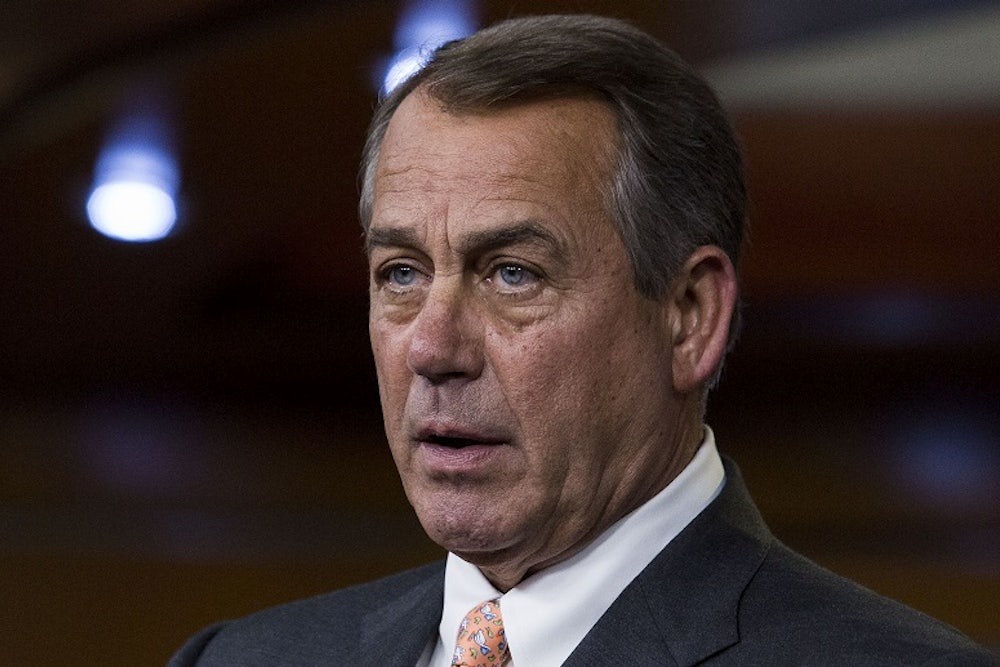On March 26, House Speaker John Boehner effectively killed the Senate deal to renew unemployment insurance before it had even passed the upper chamber. “I told the president I would consider this, as long as it was paid for,” he said, adding that his demand had “not been met." Boehner was right: The Senate deal contained a budget gimmick, known as pension smoothing, as a spending offset. It wasn’t truly paid for.
Three and half months later, House Republicans are set to use that exact budget gimmick as a spending offset to an infrastructure bill—and Boehner’s not complaining this time around.
The Highway Trust Fund, which funds projects for roads and mass transit, faces a $12 billion shortfall in 2015 and $164 billion shortfall over the next decade. Transportation Secretary Anthony Foxx has warned that the department will be unable to reimburse states for infrastructure projects starting sometime in August if Congress does not act. That would not just make our cracked roads and crumbling bridges even worse, but would put thousands of construction jobs at risk.
In response, the House and Senate have proposed a variety of ways to fill the funding gap—all of them bad ideas. With little time left to reach an agreement, policymakers have done what they do best: used the budget gimmick, pension smoothing, as a short-term patch. In less than a year, Congress will find itself in the same position once again.
Pension smoothing is a timing shift that allows companies to backload their pension contributions, boosting profits in the short term and increasing government revenues. But companies must make the full pension contributions eventually, reducing profits and government revenues in those years. In other words, it creates no savings in the long-run, as this chart from the Center for a Responsible Federal Budget demonstrates:

In fact, pension smoothing increases the risk that a company will be unable to cover its future pension obligations, potentially requiring a government bailout and costing the government money.
When they were seeking a spending offset to the five-month extension of unemployment insurance, Democrats were happy to use a budget gimmick. They would have preferred to use deficit spending, but a gimmick was the next best thing. If Republicans required a spending offset, better a fake one than one that cuts spending on the social safety net or other government programs.
Republicans, appropriately, objected to this. From the start, they had demanded a fiscally responsible solution. When Democrats masked the cost of the deal with a budget gimmick, it was reasonable for them to object. (Although Democrats are still right that a deficit-financed extension of UI is the optimal policy.)
But those objections lost all credibility on Wednesday when House Ways and Means chairman Dave Camp proposed using pension smoothing to fill the gap in the Highway Trust Fund. Boehner, who objected to pension smoothing in the Senate UI deal, even praised this legislation. “I think Chairman Camp and the members of the Ways and Means Committee have a really solid bill to help pay for the shortfall if you will, in the Highway Trust Fund for the next eight or nine months,” he said. In other words, “Yay, pension smoothing!”
This isn’t even the first time that Republicans have rejected a proposal to renew unemployment insurance because it contained a budget gimmick, only to turn around and use that gimmick as a spending offset in a different piece of legislation. In January, Senate Republicans rejected an 11-month extension of UI that was paid for by a yearlong extension of the sequester’s cuts to mandatory spending. Those cuts wouldn’t take place until 2024 though, so the GOP rejected them as too unreliable. Fair enough. But a few weeks later, House and Senate Republicans (along with most Democrats) voted in overwhelming numbers to undo cuts to military pensions. They used that yearlong extension of the sequester’s cuts to mandatory spending as a spending offset.
From blocking executive branch nominations to using the debt ceiling as a hostage device, Republicans have used a plethora of harmful tactics throughout Obama’s presidency. Boehner has also offered a number of other reasons for blocking the Senate legislation. Every one of those excuses has been proven false. But none of the GOP’s legislative strategies or excuses has been as cynical as its blockage of the Senate UI deal under the guise of fiscal responsibility.
